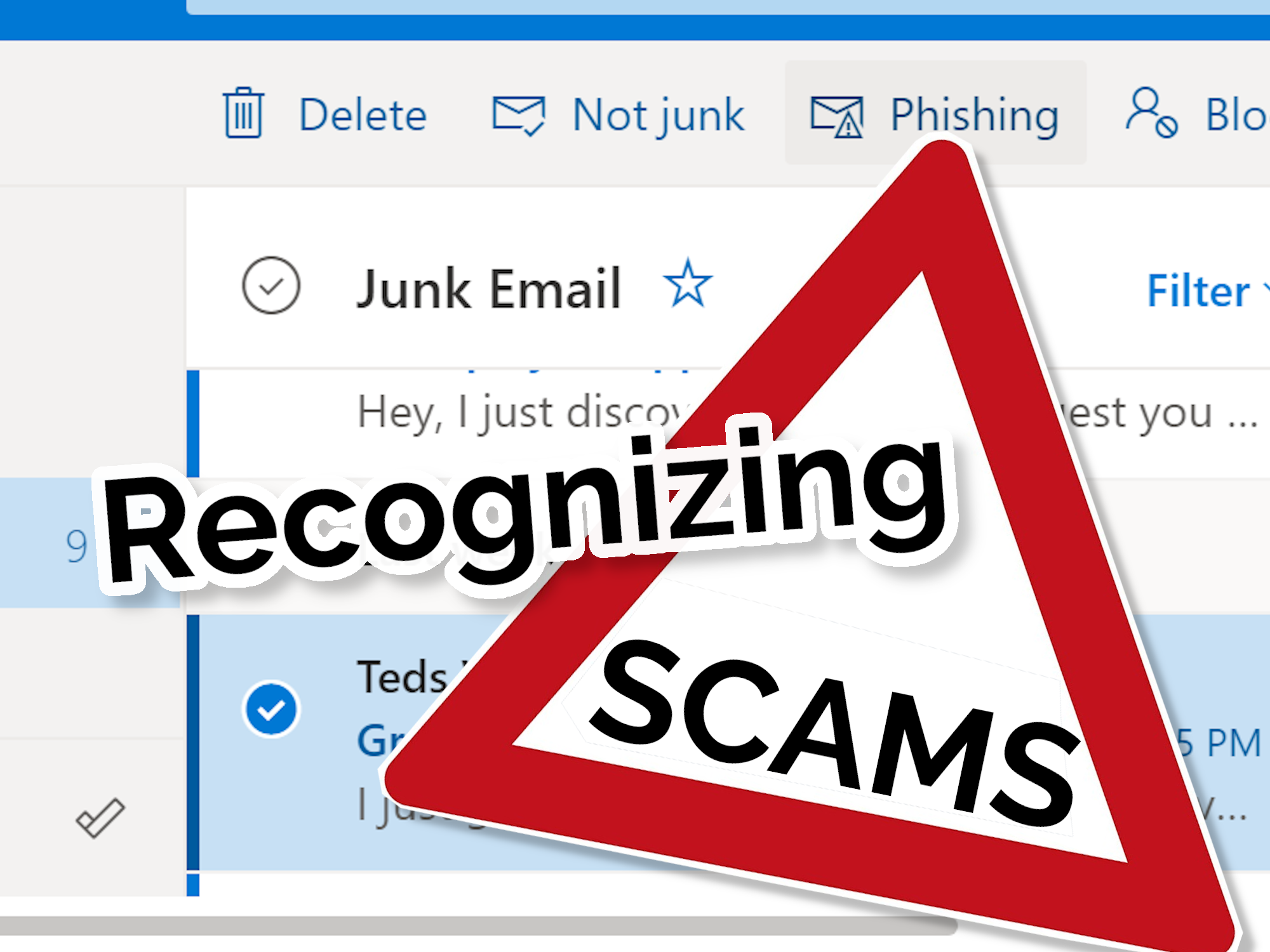Scams online are prolific. They’re everywhere. Going through the 20 most recent scams reports from WTHR Channel 13 in Indianapolis1, there have been recent scams coming at you from all directions.
Since August 2019, they1 reported on scams received by phone calls, text messages, physical mail, email, web browser pop-ups, social media, Facebook and other messenger services, fake websites, and even through fax messages!
Because of this, it’s important to always be alert when you get any communication, not just the ones listed above. Scammers are always using new methods and mediums, so any list of techniques will be only a starting point.
What if I miss out on something because I thought it was a scam?
Recently, one of Ryan’s associates sent us a gift card for a meal delivery service. (Thank you so much!) However, and through no fault of theirs, the notification for this gift card was a text message, with just a (rather shady looking) link and the message ‘Claim your gift now’.
Would you click on this link? We wouldn’t. We didn’t. Ryan deleted it. Lol, spam.
Then, a few hours later, Ryan’s associate sent a text message asking if he’d received it. He even forwarded his own confirmation email, with his very nice custom text thanking Ryan for his help. None of that text was included in the text message Ryan got.
In fact, if it had been, Ryan would have been able to check on the legitimacy of the message before deleting it.
So, did we miss out on this? No, because Ryan’s associate was able to have the company resend the text message to claim it. Legitimate offers and gifts are recoverable – the people and companies sending them want you to be able to claim them!
Recognizing Scams
While some signs of a scam are limited to specific mediums (you can only look at the sender’s email address in an email or fax, for example), I’ve broken down many of the common ways to recognize scams, regardless of medium2,3,4.
Who sent it?
Consider if you know the sender? If you do, look closer. Make sure the sender’s information (email address, phone number, Facebook account, etc.) is correct. Frequently, with scams by email, the sender’s name may appear legitimate, but the email address would be something like customerservice@realservice.baddomain.com where the scammer is trying to make their illegitimate domain look like the real domain they are trying to spoof(fake). If you are not 100% (nothing less will do here) sure that this sender is legitimate, then treat it with skepticism and move down to the section ‘Help! I think this is a scam’.
How is it addressed?
If a letter comes delivered to you and it says Current Resident, do you even open it? The same filter can be useful when trying to spot scams. If the message is sent with a generic greeting, like ‘Hi dear’, ‘Hello’, or anything else that doesn’t have your name, then treat it with skepticism and move down to the section ‘Help! I think this is a scam’.
Using your name does not mean that an email is legitimate! There have been so many data breaches that scammers can easily have your name along with your email address. But, if they don’t, it can be an easy sign to recognize.
Are there errors in the message?
If the message contains spelling errors or obvious grammatical errors, it may be a sign it’s a scam. This is most applicable to messages that are presumably from official or business sources, as they are less likely to not check for these errors. For example, a message from your bank should be free of spelling errors and grammatical errors. If a scammer is trying to impersonate them with a message full of misspelled words, it should be a red flag. Do not click any links and move down to the section ‘Help! I think this is a scam’.
Is the message URGENT?
Urgency is one of the biggest feelings scammers try to invoke. If they can make you act fast enough, you might act before you realize you shouldn’t. Any time a message makes you want to immediately take action, stop. Take a moment and return to this list. Seriously, a man in Johnson County, Indiana fell victim to ‘The Grandparent Scam’6 just last October because he believed he was helping his grandson in an emergency and it turned out to be a scam.
Fake emergencies, trouble with your account, free stuff, too good to be true offers are all examples of urgent messages scammers send trying to get you to click on a link or download an attachment. If you have to pay money for a gift, it isn’t a gift! If your message contains a similar offer, then treat it with skepticism and move down to the section ‘Help! I think this is a scam’.
Do they want money?
If the scammer is asking you to send money with any apps or services, or to wire them money with MoneyGram or Western Union, or to buy gift cards and then give them the codes – stop. This is a red flag. Do not click any links and move down to the section ‘Help! I think this is a scam’.
All of these methods of payment are pretty much impossible to recover. If you give a scammer payment, it is very unlikely you will get your money back! Not all scammers are looking for money from you, many want your identity for identity theft purposes. So, just because they are not asking for money, you still don’t want to give them any information.
Hopefully these tips help you recognize scams in the future and allow you to better protect yourself online and with the technology you use every day. Read on for the 2 steps to take if you’ve gotten a message you think is a scam.
Help! I think this is a scam
Okay, don’t panic! You’ve identified a possible scam message and hopefully haven’t clicked on any links or attachments.
(Depending on how far you went before realizing it was a scam, you may need to alert the company you thought you were dealing with and change your affected passwords. Read more about password security here. )
Step 1: Contact the person or organization who sent it through a DIFFERENT method of communication.
For example, if someone claiming to be your grandson calls you claiming to have a new phone number and an emergency, don’t send them money yet! First, call the phone number you actually have for that person (or for a family member or close friend) and talk to them directly. Are they still having the emergency they told you about on the phone a moment ago? If no, then the phone call was probably a scam.
Similarly, for example, if you get an email from what may be your bank, but one of the signs above is there, go directly to the website for the service in question. DO NOT CLICK on any links or attachments. If the email claims to be from ABCCreditUnion.com and you have an account with ABC Credit Union, then go directly to their official website and login. Check your messages or alerts and see if the message in the email is present. If not, the email was probably a scam. Still not sure? Call them directly.
If your message was not a scam, you shouldn’t report it and should stop here.
Step 2: Report it
In many email systems you can mark emails are spam or phishing, and this helps email organizations better recognize it and devise systems to prevent it from reaching out inboxes. Here in Indiana and the United States of America, you can report phishing to the Federal Trade Commission:
“If you got a phishing email, forward it to the Anti-Phishing Working Group at reportphishing@apwg.org. If you got a phishing text message, forward it to SPAM (7726). Report the phishing attack to the FTC at ftc.gov/complaint.”2
What scams have you received? Tell us how you recognized them in the comments on the blog!
References and Further Reading
- WTHR 13. (n.d.). Tagged: scam. Retrieved May 21, 2020, from https://www.wthr.com/tags/scam
- Federal Trade Commission. (May, 2019). How to Recognize and Avoid Phishing Scams. Retrieved May, 21, 2020, from https://www.consumer.ftc.gov/articles/how-recognize-and-avoid-phishing-scams
- Federal Trade Commission. (September, 2019). Phone Scams. Retrieved May 21, 2020, from https://www.consumer.ftc.gov/articles/0208-phone-scams
- Australian Competition & Consumer Commission. (n.d.) Protect yourself from scams. Retrieved May 21, 2020, from https://www.scamwatch.gov.au/get-help/protect-yourself-from-scams
- (2015). Recognizing Online Scams. Retrieved May 21, 2020, from https://www.intel.com/content/dam/www/program/education/us/en/documents/intel-easy-steps/easy-steps-activity-online-scams.pdf (PDF)
- (October 22, 2019). Elderly man scammed out of thousands of dollars over phone. Retrieved May 22, 2020, from https://www.wthr.com/article/elderly-man-scammed-out-thousands-dollars-over-phone
- (May 21, 2020). State warns of fake COVID-19 contact tracing calls. Retrieved May 21, 2020, from https://www.wthr.com/article/state-warns-fake-covid-19-contact-tracing-calls
- (May 11, 2020). VERIFY: How to make sure your stimulus check is real. Retrieved May 21, 2020, from https://www.wthr.com/article/verify-how-make-sure-your-stimulus-check-real
- (April 16, 2020). Sharing you senior portrait on social media could lead to scammers getting your information. Retrieved May 21, 2020, from https://www.wthr.com/article/sharing-you-senior-portrait-social-media-could-lead-scammers-getting-your-information
- (April 05, 2020). IRS focuses on scammers as stimulus checks roll out. Retrieved May 21, 2020, from https://www.wthr.com/article/irs-focuses-scammers-stimulus-checks-roll-out
- (April 02, 2020). IRS warns Americans about coronavirus-related scams. Retrieved May 21, 2020, from https://www.wthr.com/article/irs-warns-americans-about-coronavirus-related-scams
- (March 27, 2020). VERIFY: Fake text messages impersonating banks, talking about government checks and how to spot them. Retrieved May 21, 2020, from https://www.wthr.com/article/verify-fake-text-messages-impersonating-banks-talking-about-government-checks-and-how-spot
- (February 23, 2020). ‘It’s a huge win’: Idaho bank employees thwart scam, saving customer thousands of dollars. Retrieved May 21, 2020, from https://www.wthr.com/article/its-huge-win-idaho-bank-employees-thwart-scam-saving-customer-thousands-dollars
- (February 19, 2020). VERIFY: Watch out for coronavirus scams. Retrieved May 21, 2020, from https://www.wthr.com/article/verify-watch-out-coronavirus-scams
- (January 29, 2020). Better Business Bureau issues warning of scams in light of Kobe Bryant tragedy. Retrieved May 21, 2020, from https://www.wthr.com/article/better-business-bureau-issues-warning-scams-light-kobe-bryant-tragedy
- (January 23, 2020). Reports: Texting scam disguises itself as delivery notification from Amazon, FedEx. Retrieved May 21, 2020, from https://www.wthr.com/article/reports-texting-scam-disguises-itself-delivery-notification-amazon-fedex
- (December 18, 2019). Scammer tells North Dakota father his Marine son is dead. Retrieved May 21, 2020, from https://www.wthr.com/article/scammer-tells-north-dakota-father-his-marine-son-dead
- (November 20, 2019). BBB warns about ‘Secret Sister’ scam on Facebook. Retrieved May 21, 2020, from https://www.wthr.com/article/bbb-warns-about-secret-sister-scam-facebook
- (November 17, 2019). Real cops turn the tables on a scammer posing as an officer. Retrieved May 21, 2020, from https://www.wthr.com/article/real-cops-turn-tables-scammer-posing-officer
- (November 14, 2019). It’s a ‘SCAM’ warns Costco, stop sharing this fake $75 coupon on social media now. Retrieved May 21, 2020, from https://www.wthr.com/article/its-scam-warns-costco-stop-sharing-fake-75-coupon-social-media-now
- (November 07, 2019). Digital wallets like Apple Cash can’t help if you’re scammed. Retrieved May 21, 2020, from https://www.wthr.com/article/digital-wallets-apple-cash-cant-help-if-youre-scammed
- (October 29, 2019). Johnson County man with dementia scammed out of $4,000. Retrieved May 21, 2020, from https://www.wthr.com/article/johnson-county-man-dementia-scammed-out-4000
- (September 27, 2019). BBB warns of Facebook scam asking ‘Is this you?’. Retrieved May 21, 2020, from https://www.wthr.com/article/bbb-warns-facebook-scam-asking-you
- (September 19, 2019). Police warn of scam targeting Venmo users. Retrieved May 21, 2020, from https://www.wthr.com/article/police-warn-scam-targeting-venmo-users
- WTHR. (August 22, 2019). Scott Swan confronts man using his photos to ‘catfish’ others. Retrieved May 21, 2020, from https://www.wthr.com/article/scott-swan-confronts-man-using-his-photos-catfish-others



